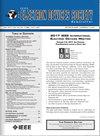Cross-Temperature FeFETs Enabling Long- and Short-Term Memory for Reservoir Computing Network
IF 2.4
3区 工程技术
Q3 ENGINEERING, ELECTRICAL & ELECTRONIC
引用次数: 0
Abstract
Hardware neural networks based on emerging nonvolatile memory are promising candidates to overcome the Von Neumann computing bottleneck. This study investigates the device characteristics and reliability of ferroelectric field-effect transistors (FeFETs) with a focus on their temperature-dependent performance. At 300 K, the FeFET demonstrates a 6.2 V memory window (MW) with 26.4% endurance degradation after 107 program/erase (P/E) cycles and 92.39% retention after 104 s. The accelerated charge trapping/detrapping dynamics enable superior short-term memory (STM) functionality. Remarkably, cryogenic operation at 77 K enhances the MW to 8 V while achieving exceptional stability with merely 0.4% degradation after 107 cycles and 99.02% retention at 104 seconds. The enhanced characteristics make it ideal for long-term memory (LTM) applications. Moreover, a reservoir computing (RC) network is proposed based on the cross-temperature FeFETs. By integrating the STM properties at 300 K and the LTM benefits at 77 K, the proposed RC network achieves a classification accuracy of 76.73% on the CIFAR-10 image recognition task. This surpasses the standalone results of 41.65% and 23.69% of 300 K and 77 K conditions, respectively. The findings highlight the potential to develop highly energy-efficient FeFET-based neuromorphic computing with varying temperature systems.油藏计算网络中实现长短期记忆的交叉温度效应
基于新兴的非易失性存储器的硬件神经网络是克服冯·诺依曼计算瓶颈的有希望的候选人。本文研究了铁电场效应晶体管(fefet)的器件特性和可靠性,重点研究了它们的温度依赖性性能。在300 K时,ffet显示出6.2 V的记忆窗口(MW),在107个程序/擦除(P/E)循环后,耐久性下降26.4%,在104 s后保持92.39%。加速电荷捕获/去捕获动态实现卓越的短期记忆(STM)功能。值得注意的是,77 K的低温操作将MW提高到8 V,同时获得了出色的稳定性,107次循环后仅下降0.4%,104秒保持99.02%。增强的特性使其成为长期记忆(LTM)应用程序的理想选择。此外,提出了一种基于交叉温度效应场效应的储层计算网络。通过综合300 K时的STM特性和77 K时的LTM优势,本文提出的RC网络在CIFAR-10图像识别任务上的分类准确率达到76.73%。这超过了300 K和77 K条件下分别41.65%和23.69%的独立结果。这一发现突出了在不同温度系统下开发高能效的基于feet的神经形态计算的潜力。
本文章由计算机程序翻译,如有差异,请以英文原文为准。
求助全文
约1分钟内获得全文
求助全文
来源期刊

IEEE Journal of the Electron Devices Society
Biochemistry, Genetics and Molecular Biology-Biotechnology
CiteScore
5.20
自引率
4.30%
发文量
124
审稿时长
9 weeks
期刊介绍:
The IEEE Journal of the Electron Devices Society (J-EDS) is an open-access, fully electronic scientific journal publishing papers ranging from fundamental to applied research that are scientifically rigorous and relevant to electron devices. The J-EDS publishes original and significant contributions relating to the theory, modelling, design, performance, and reliability of electron and ion integrated circuit devices and interconnects, involving insulators, metals, organic materials, micro-plasmas, semiconductors, quantum-effect structures, vacuum devices, and emerging materials with applications in bioelectronics, biomedical electronics, computation, communications, displays, microelectromechanics, imaging, micro-actuators, nanodevices, optoelectronics, photovoltaics, power IC''s, and micro-sensors. Tutorial and review papers on these subjects are, also, published. And, occasionally special issues with a collection of papers on particular areas in more depth and breadth are, also, published. J-EDS publishes all papers that are judged to be technically valid and original.
 求助内容:
求助内容: 应助结果提醒方式:
应助结果提醒方式:


